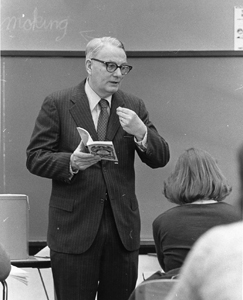Maclean's 'Sheer Delight' in Ideas Lives On
 |
The late Professor of English Hugh Maclean in his trademark jacket and tie. |
What does Hugh N. Maclean, who passed away in 1997, have to do with a hip academic symposium on the Rhetorics of Plague being held at the University at Albany Feb. 26-27?
More than one might imagine. Distinguished Service Professor of English and American Literature Ronald A. Bosco once wrote that Maclean took "sheer delight" in ideas for their own sake and "for what ideas could do toward improving the human condition."
On Feb. 26 at 4:30 p.m., Graham Hammill of the University at Buffalo, will give the Hugh Maclean Memorial Lecture on "Miracles and Plagues: Plague Discourse as Political Thought," in the Standish Room of the Science Library.
Maclean taught English at the University at Albany from 1963 until his retirement in 1986. His specialty was British literature. He was a recipient of the Chancellor's Award for Excellence in Teaching. From 1974 on, he was a Distinguished Teaching Professor at UAlbany.
"Hugh's meticulous editions of Edmund Spenser and Ben Jonson and the Cavalier poets won wide praise and will surely endure, but to the generation of students he prepared at Albany he may well be better remembered for his innovative courses on Milton and Modernism, the literature of war, or Nathaniel Hawthorne's and Stephen Crane's realism," wrote Bosco of Maclean in a UAlbany Magazine piece Character in the Academy.
This willingness to go far outside of his area of specialization is reflected in the cross-disciplinary nature of the new symposium, which draws on fields from anthropology, medieval literature and history, to theatre, film, and women's studies.
Distinguished Teaching Professor of English Stephen North said it took him quite a while to get to know Maclean.
"At first, he was this extraordinary teacher my fellow students talked about, one who made Spenser and Jonson and other writers of the distant past come fully alive. Frankly, I was scared to death of him: his office was directly across from the multi-T.A. (Teaching Assistant) bullpen, he was always in it, and his sheer presence � always the tie and jacket, the military bearing, the orderly rows of books � made us behave more professionally."
Later on, when North served as a graduate student representative with Maclean on the SUNY-wide Senate, they had dinner and drinks a few times.
"The presence was still there, for sure, but now there was a person, too. This Hugh had a twinkle in his eye I hadn't noticed before, and a ready, wry, smile. He always called me by my last name �'North'-- but in a way that made it feel like praise, like I was on the roster, if that makes any sense."
Born in New York City, Maclean graduated from Princeton in 1940. His military bearing may have come from his time serving in the Argyll and Sutherland Highlanders of Canada. After the war, he earned a master's degree and a doctorate in English at the University of Toronto.
North, whose expertise is in teaching composition, noted, "Once he (Maclean) told me that while he didn't understand much about my field, he liked the way I worked�the scholarly equivalent, as far as I was concerned, of having Ted Williams say he thought my swing might have some potential. I feel fortunate to have known him."
Kathleen Thornton, who is retired from the English Department, took a Shakespeare seminar from Maclean in 1982.
"Hugh helped me to find my voice. He helped me to recognize that original thinking was not only acceptable but encouraged," said Thornton.
![]() For more news, subscribe to UAlbany's RSS headline feeds
For more news, subscribe to UAlbany's RSS headline feeds


